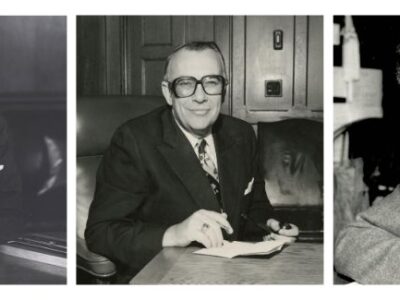All kidding aside, this is an ominous sign, one that no amount of sensitivity training is likely to ameliorate. Trust is earned more than learned, at least in terms of delving into reading material, fictitious or otherwise. Indeed, fewer social attitudes are harder to develop and easier to destroy than trust, both public and private. For an entire culture, it takes generations to build trust among members of civil society; for an individual, years, at least. What about politicians and the citizens on whose behalf they speak? That indeed is the question that confronts us this election season, and arguably more important than any of the specific issues engaged—Iraq, health care, education, whatever. Why? Because no political system, regardless of how ingeniously it is designed, can survive indefinitely without maintaining public trust.
Unfortunately, scholarly research into levels of public trust does not present an encouraging picture. Statistics vary only slightly on this topic, and the overall pattern is clear: prior to the 1960s Americans tended more to trust each other and their political leaders, by significant majorities. Now, the opposite is true. Americans no longer trust each other or their elected leaders very much, and most tend to believe that politicians represent special interests more than they do ordinary folks. Indeed, the level of public cynicism has raised concerns among responsible Americans who wince every time they hear one of our political leaders accuse another of premeditated lying; or worse, of treason.
Such are the poisonous results of negative political advertising, which has become standard operating procedure in any highly charged campaign. Comparing political leaders to Hitler or Benedict Arnold may achieve short-term goals of destroying your opponent’s credibility, but such political rhetoric has had devastating long-term effects on how citizens think about their elected leaders. Our country’s founding fathers were acutely aware of this phenomenon. The Declaration of Independence made reference to King George’s “long train of abuses” that finally severed those precious filial ties, that bond of trust between American colonists and their Mother Country. Authors of the Federalist Papers argued that habits of loyalty among citizens to each other and for the new Constitution would develop only after decades of successful governance that had earned peoples’ trust. They all recognized that even a government based on self-interest could not long survive unless a minimal amount of civic virtue based on mutual trust existed in the population and between citizens and government. Perhaps this is what Benjamin Franklin had in mind when questioned about the kind of government the founders had created. “A republic!” he stated firmly. “If you can keep it.”
So, how can we the heirs of our brilliant forebears keep the republic? Here’s a suggestion: don’t say or do anything that destroys trust. Instead of hurling vicious epithets at each other, simply say, “I disagree with your policy views, and here are the reasons.” Don’t say, as Howard Dean once said, that George Bush was not his neighbor. Dean’s party affiliation is irrelevant here; of course Bush is his neighbor. And Mr. Dean is the President’s neighbor, as well. We’re all neighbors; we’re all in this together. Always keep in mind that trust is the glue that holds society together. Understand that trust works.
Trust me.




